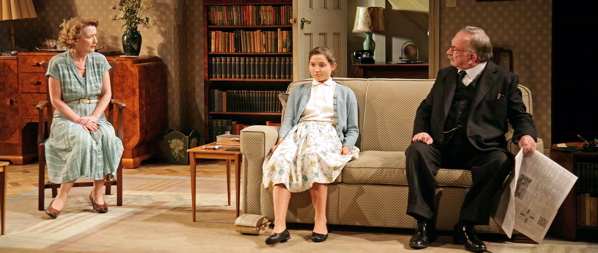By Ray Bennett
LONDON (The Hollywood Reporter) – Mike Leigh’s new play “Grief” is the complete opposite of his film “Happy-Go Lucky” with a family rendered almost cataleptic by personal loss and the gloom of post-World War II England.
Given its World Premiere on the Cottesloe Stage of the National Theatre on Sept. 21, the drama boasts all of the filmmaker and playwright’s skill in the delineation of character and his ability to draw extraordinary performances from his cast of Leigh regulars.
Lesley Manville plays Dorothy, a middle-aged woman whose RAF officer husband was killed in the war and whose absence is a constant and unbearable weight. She shares her colorless but tidy home with her sullen and resentful 15-year-old daughter Victoria (Ruby Bentall) and doleful and disappointed single older brother Edwin (Sam Kelly).
It is 1958, and while Victoria, in her proper school uniform, burns like a slow fuse, her mother conforms to the remembered rules of strict lower-middle class English manners. Her daily routine is to struggle through each day as she mismanages her housekeeper, gazes at the photo of her late husband on the mantelpiece, and prepares dinner for Victoria and Edwin.
Oblivious to her daughter’s loss of a father as an infant, Dorothy imagines she can keep “my little girl” even as the teenager begins to respond to the way society has changed beyond their cloistered home. It’s the time of the Sputnik, the Everly Brothers and the birth of computers. Most evenings, as Victoria smolders in her bedroom, Dorothy and Edwin are wont to break briefly into a song such as “Goodnight, Sweetheart” or “Smile” in sweet and harmonious but deeply mournful tones. Then they indulge in a glass of sherry: “Chin, chin.”
The days are broken up occasionally by a visit from Dorothy’s old friends Gertrude (Marion Bailey) and Muriel (Wendy Nottingham), who prattle on about their better-off lives and reminisce about the trio’s younger days as telephonists. A talkative doctor named Hugh (David Horovitch) also pops in to share a drop of whisky and perhaps a game of cards with Edwin. These intruders make no dent in the stultified routine of Dorothy and Edwin, although Victoria makes plain her disdain for all of them.
In typical Leigh fashion, each character is defined cleverly by the words they are given. Dorothy is quick to apologise if she forgets and wears her kitchen apron in the living room, “So sorry,” and she chides her daughter when she smokes a cigarette or drinks “that ghastly Coca-Cola.” Manville captures her despair with precise movements, small hesitations and frequent stillness when she stares hopelessly into the abyss. Kelly, too, has the ability to freeze as if caught in horrified recognition of the complete emptiness of his life.
Bentall makes the unsmiling daughter a potential time bomb while Bailey, Nottingham and Horovitch bring small amounts of merriment and laughter into the fray with expert timing and inflection.
Composer Gary Yershon’s elegiac score for violin, bass and vibraphone adds fluidly to the claustrophobic set designed by Alison Chitty while lighting designer Paul Pyant conveys the monotony of the daily drawing of curtains and switching on and off of lights.
It’s an engrossing and moving production as Leigh maintains the depressing tone with great discipline but underscores everyone’s insufferable politeness with a tension that ratchets up to an explosive finale.
Venue: National Theatre, London, runs through Jan. 28; Cast: Lesley Manville, Sam Kelly, Ruby Bentall, David Horovitch, Marion Bailey, Wendy Nottingham, Dorothy Duffy; Playwright, director: Mike Leigh; Set designer: Alison Chitty; Lighting designer: Paul Pyant; Sound designer: John Leonard; Music: Gary Yershon; 2 hours with no interval.
This review appears in The Hollywood Reporter and here’s more about Grief

